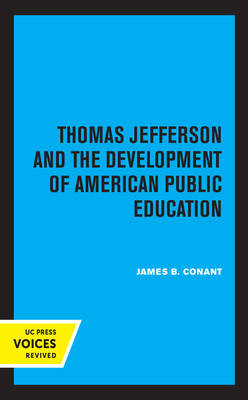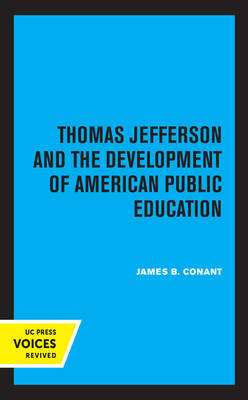
- Retrait en 2 heures
- Assortiment impressionnant
- Paiement sécurisé
- Toujours un magasin près de chez vous
- Retrait gratuit dans votre magasin Club
- 7.000.0000 titres dans notre catalogue
- Payer en toute sécurité
- Toujours un magasin près de chez vous
Thomas Jefferson and the Development of American Public Education
James B Conant
67,95 €
+ 135 points
Format
Description
Thomas Jefferson and the Development of American Public Education by James B. Conant originates from the Jefferson Memorial Lectures delivered at the University of California in 1960. Conant uses this platform to revisit Jefferson's role as both a visionary political leader and an educational innovator, situating his ideas within the broader trajectory of American schooling. Having earlier spoken on the Jeffersonian tradition in education while serving as President of Harvard, Conant now expands beyond selective scholarship schemes to address Jefferson's entire philosophy of public education. He explores Jefferson's proposals for free education at all levels for talented but impoverished youth, his advocacy for diffusion of knowledge as a safeguard for democracy, and his attempts to establish systematic schooling in Virginia. The first two chapters trace Jefferson's wide-ranging contributions to educational thought, while the third returns to the enduring question of access and merit in American society. Conant's study also places Jefferson's educational vision in historical context, juxtaposing his unfulfilled proposals with the actual development of public education across the nineteenth century and beyond. By linking Jefferson's democratic ideals to the eventual rise of America's unique system of public schools, Conant underscores both the originality and the limitations of Jefferson's initiatives. The volume includes a substantial appendix of Jefferson's own writings--letters, legislative drafts, and reports--that reveal his commitment to education as a cornerstone of republican government. For Conant, understanding Jefferson's educational philosophy is not merely an exercise in historical appreciation; it is a way of grasping how foundational ideals shaped, and continue to shape, the evolving structure of American schooling. The book thus bridges biography, intellectual history, and policy analysis, highlighting the lasting significance of Jefferson's educational thought for modern debates about equity, opportunity, and the civic purposes of education. This title is part of UC Press's Voices Revived program, which commemorates University of California Press's mission to seek out and cultivate the brightest minds and give them voice, reach, and impact. Drawing on a backlist dating to 1893, Voices Revived makes high-quality, peer-reviewed scholarship accessible once again using print-on-demand technology. This title was originally published in 1962.
Spécifications
Parties prenantes
- Auteur(s) :
- Editeur:
Contenu
- Nombre de pages :
- 176
- Langue:
- Anglais
- Collection :
Caractéristiques
- EAN:
- 9780520339033
- Date de parution :
- 28-05-21
- Format:
- Livre broché
- Format numérique:
- Trade paperback (VS)
- Dimensions :
- 152 mm x 229 mm
- Poids :
- 267 g

Seulement chez Librairie Club
+ 135 points sur votre carte client de Librairie Club
Les avis
Nous publions uniquement les avis qui respectent les conditions requises. Consultez nos conditions pour les avis.





